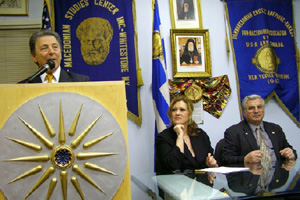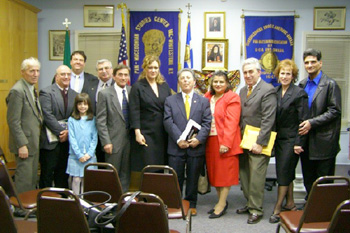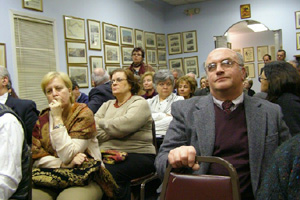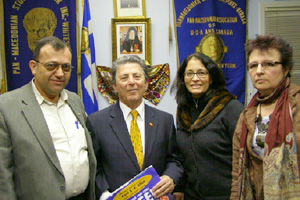|
"Sicily was an uninhabited paradise of green forests and rivers in 1000 B.C.," said Dr. Gaetano Cipolla on Friday evening, Feb. 24th at the Pan-Macedonian Studies Center in Whitestone, New York. "Greek navigators explored the island for several hundred years. There were few persons and Carthaginians on the island. The Greeks began the first massive colonization of the island. They were the first to settle and develop a Sicilian civilization. While other persons came as conquerors, the Greeks came to stay and gave to Sicily," continued the speaker. Dr. Cipolla, a St. John's University professor at the Languages and Literatures Department, is the foremost Sicilian-American historian in the United States.
This unique lecture was co-sponsored by the Pan-Macedonian Federation. Over one hundred persons attended with standing room only. Dr. Arthur Flug, Director of the Holocaust Center at Queensborough Community College, was a guest speaker. Mrs. Nancy Biska, journalist at LaGuardia Community College, was lecture chairperson and moderator. Elias Neofytides of Macedonian Television and Eleni Daniels of Cosmo FM were among the prominent persons of the communications field. Outstanding leaders of the Greek-American community from Connecticut, New Jersey and New York attended.
"In 2001, a popular Sicilian song sand about the one eyed Cyclops who lived on Mount Etna and was blinded by Odysseus. Brute force was outwitted by superior intelligence. Odysseus (Ulysses) was the first of many conquerors who disturbed the idyllic peace of Sicily. Six dominations of foreigners were attracted to the beauty of the landscape. The Greeks were not outsiders, but an integral part of history. Sicily was Greek and an important part of Magna Graecia."
Dr. Cipolla said the "Greeks were everywhere. Their view of history changed the face of Italy. The island's natural beauty sparked the Greek imagination. Sicily was the 'Promised Land' to Greece. Colonists founded Naxos in 734 B.C. Their next settlements were Syracuse, Catania, Gela and Agrigento. All the primary cities were on the coast. There was easy access to fertile plains."
"Sicily conditioned and shaped culture in its own image," said Dr. Cipolla. "The Sicilianization of the Greek colonies began. Persons came in search of a land to cultivate. The Greek colonists were enterprising and saw a peace in the 'Island of the Sun,' as Homer said. The Greeks came to stay, becoming Sicilian. They transformed themselves from Greeks to Sicilian-Greeks and finally to Sicilians. The Siciliotes kept the land for Sicilians, as Syracuse fought against the Athenians. The Spartan shield's image of one leg changed to three legs. This symbol of three legs, the trinakria, describes the shape of the island, according to Homer. Trinakria became the symbol of Sicily and is on the national flag."
"The Sicilian-American scholar explained to a mesmerized audience that after the defeat of the Athenian navy during the Peloponnesian War, Syracuse became the dominant power with Agrigento of the known world. In 480 B.C., the Greek cities under the leadership of Syracuse defeated the Carthaginians at Himera. The entire island was united under Greek rule. This devastating Carthaginian defeat put an end to the practice of human sacrifice. Greek tyrants did not have negative connotations in that era. It was positive rule. Tyrant meant war lord. The conquest of Sicily by Rome put an end to its most splendid and prosperous period. Sicily never achieved the political and cultural prominence in subsequent history that it saw under the Greek cities. Syracuse made Sicily a leading cultural center on a grander scale than Greece."
"America received its language and customs from Greece," stated the St. John's university professor. "Sicily received its language and customs from Greece. Western civilization owes much to Sicily. Magna Graecia was Sicily and Southern Italy. It was not a one way street. Sicily gave to Greece and the known world the greatest thinker of Antiquity: Archimedes of Syracuse. He lived his entire life in Sicily. His mathematical formulas, war machines and scientific discoveries changed the known world. There was a constant exchange from Sicily to Greece. The Art of Public Speaking was developed here. Empedocles of Agrigento, the Father of Philosophy, was viewed as a God by Agrigentines. Aeschylus wrote the play Women of Aetna and died in Gela. Sappho of Lesbos and Simonides traveled to Syracuse. Many believed the Odyssey describes places in Sicily. Daedalus ended his journey at the island. Minos, King of Crete, went to Sicily. The myth of Demeter and Persephone took place in Sicily that has two seasons of winter and summer. The Goddess Athena gave Sicilians the olive tree. The Gods of the Greeks were the Gods of the Sicilians."
"The connection between Greece and Sicily extended after the Roman domination," Dr. Cipolla forcefully asserted. "Greek was the dominant language till 7th century A.D. The east coast of Sicily has persons whose physical appearance is more similar to Greeks. The Sicilians are firstly similar to Greeks, then Arabs and lastly the Normans. Sicily is the key to understanding Greece. European intellectuals flocked to Sicily to discover the 'light of Greece.' Greek literature survived and triggered the Renaissance because of a Sicilian merchant who saved 578 manuscripts. Return Home! Come and visit Sicily." This lecture is based on Dr. Cipolla's book Siciliana: Studies on the Sicilian Ethos.
Dr. Gaetano Cipolla is a Professor at St. John's University. He is a well known authority on Sicily. His scholarly activities focus on several fields: as a translator of Italian/Sicilian poetic and dramatic texts, an editor and a publisher. He is the author of What Makes a Sicilian? a successful booklet already in its third reprint and an opera libretto entitled "A Lupa in Siciliana". His book Sicilian: Studies on the Sicilian Ethos, contains chapters on the Greek, Jewish, and Arabic presence and on their influence on Sicilians.
Dr. Cipolla published numerous essays on Petrarca, Dante, Tasso, Pirandello, Calvino and others in Italian journals. He was Co-Director of La Parola Del popolo, the oldest Italian language journal in this country from 1978 to 1984. He is President and Editor of Arba Sicula, an international organization that promotes the language and culture of Sicily. He has received numerous awards and recognitions such as the Telamone Prize in Agrigento and the Trinacria d'Argento in London. Recently, the President of Sicily appointed Dr.Gaetano Cipolla as president of Casa Sicilia. Casa Sicilia is an organization that promotes Sicily's relations with America. Their office is in the Empire State Building.
Dr. Arthur Flug, Director of the Holocaust Center at Queensborough Community College added to this special evening by describing the Greeks of Thessalonica who saved the lives of Jews during W.W. II. "When I was graduating from Jamaica H.S., it was mandatory to recite the Athenian Oath to One's City. I still remember the oath today." This unique evening of culture was followed by a coffee hour in the center's hall. For more information, visit www.Macedonia.info and www.macedonianstudiescenter.org .
|





